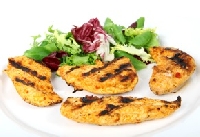How many calories to eat
By Catalogs Editorial Staff

Know what’s necessary in your daily caloric requirements
Individuals who make a lifestyle change in their eating habits no longer call themselves “dieters” but have decided to make small adjustments with the way they view food. They start watching more closely what they eat, the amount of grains and pastas they’re ingesting, the time of day they’re eating and the mood they’re in while they’re eating. Calorie-counting becomes very important so they know well in advance how many calories to eat to either maintain the weight they are or to lose/gain a few pounds. Over time, the changes become routine and a part of their normal life.
~
Deciding on how many calories to eat is different from one individual to the next. Everyone’s energy needs vary according to their lifestyle and their body make-up. An endurance athlete like a runner or swimmer may require more daily calories than a sedentary retiree. It’s a mistake to assume that everyone needs the same amount of calories simply based on their age. Incorrectly calculating the required number not only gives poor information but can be potentially harmful to the person’s health.
An Active Lifestyle
This is one determination in factoring in how many calories to eat on a daily basis per each individual. If you are active and exercise daily, you need more calories than a person who doesn’t move around as much or is sedentary. An active person burns more calories.
- Are you active more than 2-3 hours per day?
- Do you feel rejuvenated or tired at the end of the day?
- Does your active lifestyle take you outside or are you inside for the duration?
Active lifestyles vary in meaning, but usually means any type of movement or exercising that increases your heart rate and keeps it elevated for more than 20-40 minutes per session. An active person doesn’t always count how much they’re active, but it’s in their daily routine. This can include caring for small children, taking the steps instead of the elevator at work, actively working in an outside environment and anything that keeps them constantly moving and busy. Being active equals moving around…a lot!
An Inactive Lifestyle
An inactive person doesn’t need as many calories as an active individual. Their metabolism is very slow and their body will burn calories at a much lower rate. Therefore, it doesn’t take as many calories to fuel an inactive body as it does an active body. What is inactivity?
- Less than one to two hours of movement per day.
- Unable to sustain long periods of activity, i.e., exercising, walking, being outside.
- The body is physically incapable of being active.
Inactivity or a low-activity lifestyle is usually when a person is incapable of doing much more than is necessary in their daily routine. Whether that factor is physical or by choice, an inactive person’s body burns calories much slower and tends to gain weight much faster and holds it longer. Keeping their caloric intake low will help keep their weight low and maintained. For them, how many calories to eat on a daily basis can become a numbers game and more important to them than an active person.
Estimations
Men
On average, there are rough estimations on the required daily caloric intake of different individuals. For instance, a 35-year old active 6″0 male of about 200 pounds needs to consume approximately 2800 calories per day. Depending on his personal preferences, to lose weight he needs to consume 500 less calories per day for a total of 2300 calories. If he wants to gain weight, he needs to consume 500 calories more per day for a total of 3300 daily calories.
Women
An active 5″5 35-year old female of about 150 pounds needs to consume approximately 2400 calories per day. Depending on her personal preferences, to lose weight she needs to consume 500 less calories per day for a total of 2100 calories. If she wants to gain weight, she needs to consume 500 calories more per day for a total of 2900 daily calories.
Taking into account these various factors in calorie-counting and lifestyle changes are the first step in deciding your daily caloric needs and being healthy. Other factors like what to eat, when to eat, proper hydration and adequate rest are also contributing factors in maximizing any health pursuits you may have. Once you have decided on the adequate amount of calories that your body needs, all other pursuits will then become productive and you will begin to see their value right away.
Popular Savings Offers











